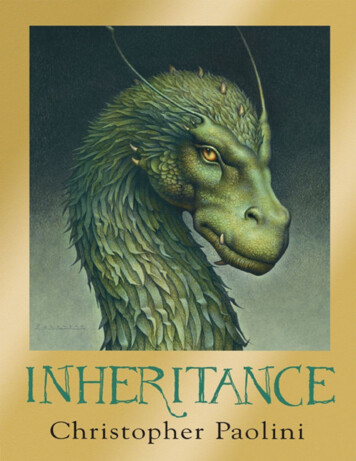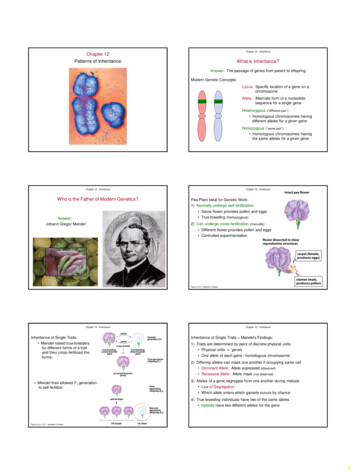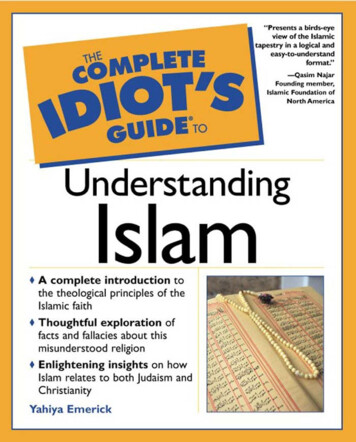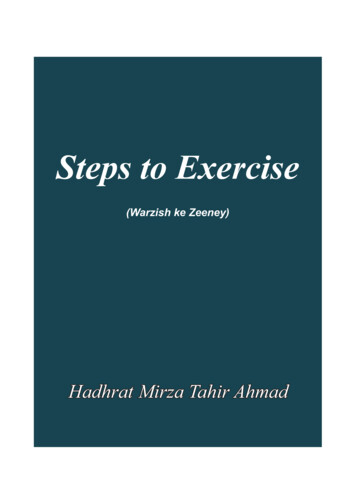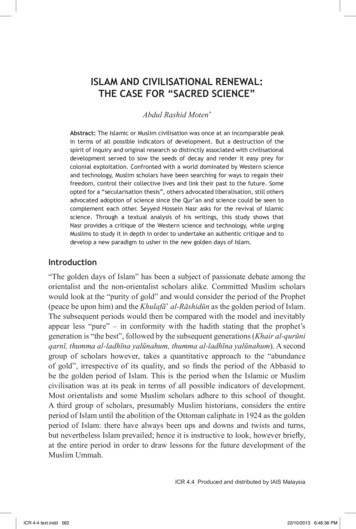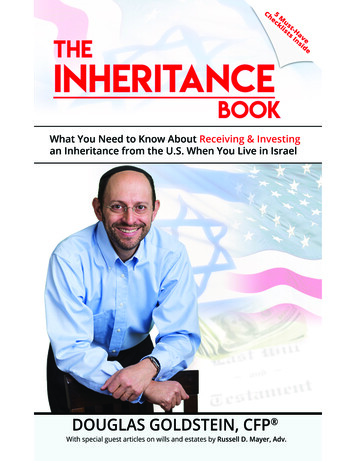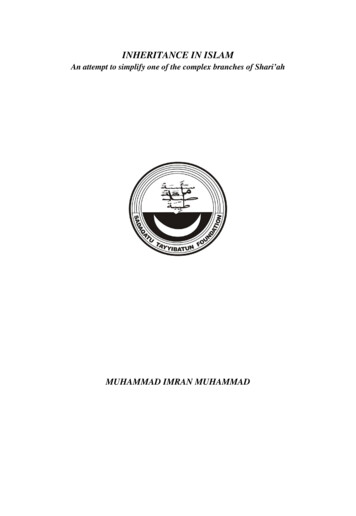
Transcription
INHERITANCE IN ISLAMAn attempt to simplify one of the complex branches of Shari’ahMUHAMMAD IMRAN MUHAMMAD
INHERITANCE IN ISLAMAn attempt to simplify one of the complex branches of Shari’ahMUHAMMAD IMRAN MUHAMMADi
COPYRIGHT SAD-TAYY FOUNDATION, 2012Copyright is hereby granted to any interested body or person to circulate,transmit or reproduce this book on NON-PROFIT basis in whatever form(hard or soft copy), provided it will be in this form and content ofpresentation.First Published, 2012Available online and for FREE download atwww.inheritance.sadtayyfoundation.orgISBN: 978-194-201-0Published bySADAQATU TAYYIBATUN FOUNDATIONPost Office Box 2630,Minna, Nigeria.www.sadtayyfoundation.orgii
TABLE OF ionPreambleSignificance of acquiring and teaching Laws of InheritanceCHAPTER ONEMale heirsFemale heirs Non-heirsImpediments to inheritanceCHAPTER TWOExclusionNote on difference of opinion CHAPTER THREEInheritance of children SonDaughterInheritance of spouses HusbandWife Inheritance of parents Father Mother Inheritance of grandparentsGrandfatherGrandmother Inheritance of siblings CHAPTER FOURResiduaries (‘Asabah) CHAPTER FIVEPartial exclusionCHAPTER SIXInheritance arithmetic (“inherithmetic”) Procedure of solving inheritance problemsLevel oneLowest Common Multiple (LCM)Highest Common Factor (HCF) Prime numbers Increment of base number (‘awl )iii-v- vi- vii- viii-1-2-3-5-6-7-9- 14- 17- 19- 20- 24- 24- 24- 25- 25- 25- 26- 26- 28- 30- 34- 37- 39- 40- 44- 46- 50- 50- 52
Level twoLevel threeCHAPTER SEVENInheritance of grandfather along with siblingsCHAPTER EIGHTSpecial cases SummaryFurther reading Solutions to exercises References-iv--- 55- 69--- 74--- 85- 89- 92- 94- 96
ACKNOWLEDGEMENTSIn the Name of Allah, the Fashioner, the All-Knowledgeable.My sincere appreciation goes to my teacher, Sheikh Musa AlhajiBaba from whom I learnt a lot. This book is a manifestation of just one of thethings he taught me. I did not only learn the theoretical aspect of inheritance,but I had the opportunity to assist him a number of times when he is calledupon by families of deceaseds to help in the distribution of their estates. Thatis when you will see men being given pots and women will inherit caps. Itmay be funny but very heart-breaking. And since it’s an injunction of Allah,it has to be done like that.Muhammad Sa’idu Jimada was the first to advice that the articles Istarted as blog contents at www.inheritanceinislam.blogspot.com becompiled into a book. He also encouraged me to incorporate it into theFoundation’s website (which I had the privilege to design) instead of startingan entire new site. I enjoy his tremendous support in every ramification. MayAllah reward you abundantly. Special gratitude goes to every member of myfamily, nuclear and extended, for providing an enabling environment whichfacilitated the writing of this book.I also thank my very good friend and teacher, Mallam Shuaibu Dajafor his useful advice and wonderful assistance. He is always at my beck-andcall despite his tight schedule. My deep appreciation goes to AlhajiMuhammadu Salawu and Dr Adamu AbdulMalik for their fatherly roles andvaluable time. To Ibrahim S. Ahmed and Mahmud Umar, I say thank you!Muhammad Imran Muhammadv
FORWARDIn the Name of Allah, the Most Beneficent, the Most Merciful. Maythe peace and blessings of Allah be on the noblest Apostle of Allah,Muhammad (peace be upon him), his household and followers till the Day ofJudgement. Amin.It is a great privilege for me to have gone through this write-upauthored by a brilliant, intelligent and hardworking brother on an importantaspect of Islam: Inheritance. For the fact that death is a channel throughwhich every living soul must pass through, when it comes, the deceasedusually leaves behind an estate which is to be shared among his relations asordained by Allah. Therefore, without the knowledge of inheritance, animportant commandment of Allah will not be carried out or will be donewrongly. So, the importance of this knowledge cannot be over emphasised.Though it is fardul-kifaya not fardul-‘ayn, the Holy Prophet (peace be uponhim) encouraged Muslims to learn it as quoted by the author from IbnMajah’s collection.This work is intended to give the reader a clear understanding of thesubject matter as it is simplified with good examples and authorities from theQur’an and Hadith. The writer has gone extra-mile to explain some basicsbefore discussing certain aspects for more clarity. This is to enable andencourage Muslim brothers and sisters especially those that acquired strictlywestern education to better appreciate this knowledge despite its complexity.I therefore, pray to Almighty Allah to bless the author for thiswonderful work aimed at the propagation of knowledge in the Ummah. I alsopray to Allah to enrich Islam with the likes of this scholar so that they makeuseful contributions through writings in order to uplift the religion and to thebenefit of mankind in general. Amin.Musa Alhaji Baba (Mantuntun)Abayi Close, MinnaNiger State.vi
DEDICATIONTo my wife, Hassana Abdullahi Bako, with whom half of myreligion is complete and Aaliya Salihu Maigari; the newest members of ourfamily.vii
INTRODUCTIONIn the name of Allah, the First, the Responsive.Before now, books on inheritance meant for English readersconcentrated more on explaining the shares of each heir probably with one ortwo examples only. But inheritance problems are diverse that mere knowingthe shares of the heirs does not provide answers to them. In fact, these shareschange depending on the circumstance. So what is required is a TEMPLATEthat can solve any kind of inheritance problem. That is what this book seeksto achieve.The distinguishing feature of this write-up is that almost half of it isdedicated to elucidating the Mathematics of inheritance because the secret ofsolving inheritance problems is to know the relationship between numbers.These are: tamathul, tadakhul, tabayin and tawafuq. Nevertheless, with therealisation that most people detest Mathematics, attempt has being made tosimplify it. Some topics in elementary Mathematics like LCM, HCF andprime numbers were reviewed for better understanding of a few concepts.Solving inheritance problems is not done by trial and error. There arestandard rules governing it. For that reason, 22 rules of (total) exclusion, 14rules of partial exclusion and 26 rules (coded A – Z) of determining basenumber (aslul mas-ala) were developed. A total of 48 examples withsolutions were used to apply all the rules.As this book is intended to provide basic knowledge of inheritance,advanced topics which to my judgement are rare occurrences likeinheritances of foetus, hermaphrodite and missing person among others wereleft out. They have been suggested for Further Reading.I pray that Allah accepts this effort as an act of Ibadah.Muhammad Imran Muhammadimranmuhd2000@yahoo.comviii
PREAMBLEDeath is inevitable. As a result, Islam being a complete way of lifehas spelt out how the deceased’s estate should be shared among his heirs. Byestate, we mean the entire property a deceased leaves behind such as houses,cars, clothes, furniture, land, farm, jewellery, cash (at hand and in bank),shares, bonds, and so on including socks and underwear; everything.Subhanal-Lah.It should be noted that when a Muslim dies, the obligations to betaken out of his estate (in order of priority are):1. Kafn (shroud) and other basic expenses relating to the funeral likegrave digger’s wage, transportation to cemetery, etc if they are to be paid for.A surviving husband is responsible for the shroud and burial expenses of hisdeceased wife if she is not endowed. There is difference of opinion in respectof a wealthy woman. Some scholars said that the husband is still responsiblewhile others are of the view that they should be paid from her estate.2. Repayment of his outstanding debt.Narrated Abu Hurairah: The Messenger of Allah (peace be uponhim) said: “A believer’s soul remains in suspense (cannot enter Paradise)until all his debts are paid off.” Ahmad, Ibn Majah, and TirmidhyCollections.Narrated Muhammad ibn Abdullah ibn Jahsh: The Messenger ofAllah (peace be upon him) said: “By Him in whose hand Muhammad’s soulis, if a man were to be killed in Allah’s path then come to life, be killed againin Allah’s path then come to life, and be killed once more in Allah’s paththen come to life owing a debt, he would not enter Paradise till his debt waspaid.” Bukhari Collection.Generally, debt can be owed to fellow humans or to Allah e.g.unpaid Zakat. The former has to be repaid, no questions about that. Scholarsdiffer as regards repayment of debt due to Allah. Some are of the view that itshould be repaid while others are in support of non-repayment. A third viewis that it should be repaid if and only if the deceased instructs same.3. Fulfilment of his will.Provided it does not exceed one-third (1/3) of the entire estate andit’s not in favour of an heir. If any or both of these conditions are notsatisfied, the validity of the will is subject to approval of all the heirs,otherwise, its void.4. The rightful heirs then inherit the remaining estate.1
Significance of acquiring and teaching the Laws of InheritanceNarrated Abu Hurairah: The Prophet (peace be upon him) said:“Learn the Fara’id (laws of inheritance) and teach it, for it is half ofknowledge and it is (easily) forgotten, and it is the first thing to be taken(away) from my nation.” Ibn Majah Collection.Narrated Abdullah ibn Mas’ud: Allah’s Messenger (peace be uponhim) said to me, “Acquire the knowledge and impart it to the people. Acquirethe knowledge of Fara’id (laws of inheritance) and teach it to the people,learn the Qur'an and teach it to the people; for I am a person who has todepart this world and the knowledge will be taken away and turmoil willappear to such an extent that two people will not agree in regard to a case ofinheritance distribution and find none who would decide between them.”Tirmithy Collection.2
CHAPTER ONEMALE HEIRSMale heirs of a deceased are fifteen (15):1. Son.This refers to a legitimate male child. A man can only have alegitimate child after contracting a legally (Shari’ah) acceptable marriagewith a woman outside his prohibited degree; while a woman can have alegitimate child with or without a formal marriage contract. This will bediscussed in details under Inheritance of Children in chapter three.2. Grandson or his descendant.Everyone has two categories of relatives: agnates and cognates.Agnates are relatives whose connection is traceable through the father ormale line such as paternal grandparents, paternal uncle, paternal aunt, etc.,while cognates are relatives whose connection is traceable through themother or the female line like maternal grandparents, maternal uncle,maternal aunt and so on. Now, only agnates are eligible to inherit the estateof a deceased; meaning that all cognates are NOT bona-fide heirs exceptuterine brothers/sisters and maternal grandmother to whom the Qur'anassigns a share (more on this later).Therefore, the grandson referred to here as a male heir is the onethrough a son. The grandson through a daughter is a non-heir. For example,‘A’ (who may either be a male or female) has a son ‘B’, who also begets ason ‘C’. When ‘A’ dies, his/her son ‘B’ inherits from him/her as the case in(1) above. ‘C’ is excluded. We shall discuss ‘exclusion’ in the next chapter.However, if ‘B’ is absent at the time ‘A’ dies; meaning that ‘B’ died before‘A’, then ‘C’ the grandson will represent or stand in place of ‘B’ and inheritfrom ‘A’. I call this phenomenon “jumping.”Assuming ‘C’ has a son ‘D’ who also has a son ‘E’, ‘E’ will inheritfrom ‘A’ if and only if ‘B’, ‘C’ and ‘D’ are absent. That is what is meant by“his descendants,” i.e. the descendants of grandson ‘C’. Put in another way, agrandson will inherit from his grandfather if his father is absent. Likewise, agreat-grandson will inherit from his great-grandfather if his father andgrandfather are absent. Now, very important. This rule applies to ONLYsons. That is, ‘A’ (may be of any gender) but ‘B’, ‘C’, ‘D’, ‘E’ . must all bemales.If ‘C’ were to be a female and she marries ‘X’ who has a father ‘Y’and grandfather ‘Z’, and the marriage is blessed with a son ‘D’; when ‘A’dies, ‘C’ will inherit from him/her if ‘B’ is absent. But ‘D’ CANNOT inheritfrom ‘A’ even if ‘B’ and ‘C’ are absent because ‘A’ and ‘B’ are his cognates.‘D’ is only entitled to inherit from his parents ‘X’ and ‘C’, paternal3
grandfather ‘Y’ (in the absence of ‘X’) and paternal great-grandfather ‘Z’ (inthe absence of both ‘X’ and ‘Y’).In summary, the grandson entitled to inheritance is son’s son, notdaughter’s son. Also the descendants of son’s son (‘D’ and ‘E’ as in the firstexample above) will “jump” and inherit from ‘A’ provided ‘B’ and ‘C’ areabsent. This trend will continue down the line as far as a female does notappear. If a female emerges, she will also “jump” but her children (male andfemale) will not, because to them the line is cognate.3. Father.This is straight forward. A father shall inherit from his son ordaughter.4. Paternal grandfather or his ascendant.By now it’s clear that maternal grandfather is a non-heir. So, apaternal grandfather will inherit from his grandson or granddaughter in theabsence of his son. Using the illustration above, given that ‘A’, ‘B’, ‘C’ and‘D’ are all males and ‘E’ is either male or female; when ‘E’ passes on, ‘D’(his or her father) will inherit from him or her as the case in (3) above. In theabsence of ‘D’, ‘C’ (the paternal grandfather) will inherit from ‘E’. The sameruling applies to ascendants ‘B’ and ‘A’.5. Full brother.He has the same father and same mother with the deceased.6. Consanguine brother.He has the same father but different mother with the deceased.7. Uterine brother.He has the same mother but different father with the deceased.8. Full brother’s son or his male descendant.We said that in the absence of the son, the grandson replaces him. Ifthe grandson is also absent, the great-grandson “jumps” and take the place ofthe son. If a female appears, she equally has the privilege of “jumping,” thenthe line terminates. The difference here is that the descendants all have to bemales; such that when a full brother is absent, his son replaces him and thetrend continues. Whenever a female emerges, she is not entitled to “jump,”and the line terminates. That is what is meant by “male descendants.”9. Consanguine brother’s son or his male descendant.10. Full paternal uncle.Father’s elder or younger brother from the same father and mother.11. Half paternal uncle.Father’s elder or younger brother from the same father but differentmother.12. Full paternal uncle’s son or his male descendant.13. Half paternal uncle’s son or his male descendant.4
14. Husband.A husband will inherit from his wife if she dies before him.Likewise, if a man divorces his wife with one or two pronouncements (i.e.revocable divorce) and she dies WHILE in her Iddah (i.e. waiting period), hewill inherit from her because technically, she remains his wife. However, ifthe divorce is irrevocable (three pronouncements), he will NOT inherit fromher whether the Iddah has expired or not.15. Patron.A man who sets a slave free will inherit from the slave if the later hasno heir.FEMALE HEIRSFemale heirs are nine (9):1. Daughter.A daughter will inherit from her father and mother. This provisiondoes not extend to her children. That is to say, her children cannot replace orrepresent her to inherit from their (maternal) grandfather or (maternal)grandmother in her absence.2. Son’s daughter.If a son has a daughter, she will inherit from the son’s father ormother (her paternal grandparents) in the absence of the son. The rule alsoapplies to son’s son’s daughter, son’s son’s son’s daughter, and so on. Thishas been explained earlier under “grandson or his descendants.”3. Mother.When a son or daughter passes on, his/her mother is entitled to a partof his/her estate. She cannot be excluded no-matter what happens.4. Either grandmother.In the absence of mother, both grandmothers i.e. maternal andpaternal will inherit from a deceased. Here, the “ascendant rule” applies,such that if one or both grandmothers is/are absent, the great-grandmotherswill take their place(s) and inherit from the deceased.5. Full sister.6. Consanguine sister.7. Uterine sister.8. Wife.A wife will inherit from her late husband. She cannot be excluded.She will also inherit from him if he dies after divorcing her with one or twopronouncements (revocable divorce) provided her Iddah has NOT elapsed.But if the divorce is irrevocable (three pronouncements), she will not inheritfrom him whether her Iddah has elapsed or not. However, if the husbandwere to be “insensitive” and divorces his wife irrevocably DURING his final5
illness in which he dies, the four schools of Islamic jurisprudence havedivergent opinions:a) As-Shafi’i - She will NOT inherit from him whether or not the Iddahhas expired.b) Abu-Hanifa - If the Iddah has not expired, she will inherit from him,otherwise, she will become a non-heir.c) Ahmad ibn Hanbal - She has the right to inherit from him whetherthe Iddah has expired or not provided she has not married anotherperson.d) Malik - She will inherit from him even if the Iddah has expired orshe has married another person.7. Patroness.A woman who sets a slave free will inherit from him/her so long ashe/she has no heir.NON-HEIRSNon-heirs are those relatives not entitled to any part of thedeceased’s estate. They include:1. Daughter’s sons and daughters and their descendants.They will inherit through their father’s (daughter’s husband’s) lineonly. Their mother’s line is cognate.2. Sister’s sons and daughters and their descendants.This refers to all the three types of sisters: full, consanguine anduterine. Their children will inherit through their father’s line only as the casewith daughter’s children.3. Daughters of full brother.4. Daughters of consanguine brother.5. Daughters of full brother’s son.6. Daughters of consanguine brother’s son7. Sons and daughters of uterine brother.8. Sons and daughters of uterine sister.9. Daughters of full paternal uncle.10. Daughters of half paternal uncle.11. Daughters of full paternal uncle’s son.12. Daughters of half paternal uncle’s son.13. Paternal aunt, her children and their descendants.14. Maternal uncle, his children and their descendants.15. Maternal aunt, her children and their descendants.16. Maternal grandfather’s mother.Given that maternal grandmother (the wife of maternal grandfather)is an heir in the absence of mother, if the maternal grandmother is also6
absent, who takes her place? Her mother. Not her husband’s mother.Therefore, maternal grandfather’s mother is a non-heir.17. Paternal grandmother’s father.As in (11) above, paternal grandmother is also an heir in the absenceof mother; but in her absence, her mother replaces her, not her father.IMPEDIMENTS TO INHERITANCEImpediment means barring an heir from getting his/her share of thedeceased’s estate due to certain circumstances. These include:1. Murder.An heir who deliberately murders the deceased will neither inheritfrom the latter’s estate nor from the diyya (i.e. blood money). If the murder isaccidental, he/she will inherit from the deceased's estate but not from thediyya.2. Difference of religion.A Muslim does not inherit from a non-Muslim relative no-matterhow close they are, and vice-versa. For instance, a Muslim father who has anon-Muslim son will not inherit from him and the other way round.3. Simultaneous death.When two or more people who are rightful heirs of one another likefather and son, husband and wife, etc die at the same time maybe under acollapsed building or in similar circumstance, and it is uncertain who diedfirst, they will not inherit from each other. But if it’s clear that the husbanddied before the wife for instance, she will be listed among the surviving heirsof the husband and given her share of his estate. Thereafter, her heirs willinherit her estate PLUS her share of the husband’s estate.4. Li'an (Cursing for adultery).This happens when a man denies the paternity of his wife’spregnancy and they end up swearing and cursing themselves as prescribed byAllah in the Qur'an (24: 6 – 9). “And for those who accuse their wives, buthave no witnesses except themselves, let the testimony of one of them befour testimonies (i.e. testifies four times) by Allah that he is one of those whospeak the truth. And the fifth (testimony) (should be) the invoking of theCurse of Allah on him if he be of those who tell a lie (against her). But itshall avert the punishment (of stoning to death) from her, if she bears witnessfour times by Allah, that he (her husband) is telling a lie. And the fifth(testimony) should be that the Wrath of Allah be upon her if he (her husband)speaks the truth.” The child that results will inherit from his mother only.5. Slavery.A slave and everything he owns belongs to his master. As far as heremains a slave, he will not inherit from his relatives and they will not inherit7
from him. The logic is that if he inherits, whatever he gets belongs to hismaster and if his relatives are to inherit from him, they will actually beinheriting part of the master’s estate.6. “Emergency marriage”.This refers to a marriage that takes place when either the bride orgroom is in a state of ill health with a 50:50 percentage of survival and deathor the percentage of death is higher. The healthy partner will not inherit fromthe sick one if he/she dies as a result of that illness. Conversely, the sickpartner will not inherit from the healthy one supposing the latter incidentallydies before the former. But if the sick partner fully recovers, then either ofthem dies, this rule will not apply.8
CHAPTER TWOEXCLUSIONExclusion means preventing a rightful heir from having any share ofthe deceased’s estate due to the PRESENCE of another heir. The principlebehind who excludes who is the degree of closeness to the deceased. Thecloser relatives will exclude those who are not so close. For example, sonwill exclude grandson. A grandson can only inherit in the absence of a sonsince the latter is closer to the deceased than the former. Note that there is adifference between exclusion and impediments to inheritance. In exclusion, a“stronger” heir eliminates a “weaker” heir while impediment has to do withpreventing an heir from inheriting due to circumstances like murder,difference of religion, slavery, etc.There are two types of exclusion: total and partial. The definitionabove refers to total exclusion. Partial exclusion means reducing the share ofthe estate an heir should have gotten due to the existence of another heir. Forinstance, a husband inherits half (½) of his wife's estate if she has no child,but supposing she has a child even if from a previous husband, he gets onequarter (¼) of her estate. This reduction from ½ to ¼ is called partialexclusion. Details in chapter five. Meanwhile, we intend to concentrate ontotal exclusion. So, unless otherwise specified, whenever we say “exclusion,”we mean “total exclusion.”Now, among the heirs (male and female), there are those I call “basicheirs,” because they cannot be excluded irrespective of who is present. Theyare: son, daughter, father, mother, husband and wife. The worst that canhappen to them is to be partially excluded. Exclusion is quite a complexconcept. Thus, we will try to simplify it using analogies. Do not mind anyrepetitions. They are for easier and clearer understanding.Let's say that an individual ‘X’ (who may either be a male or female)has two sons ‘A’ and ‘B’. ‘A’ has 2 sons and a daughter while ‘B’ has a sonand 3 daughters. This means that ‘X’ has 7 grandchildren (3 sons, 4daughters).a) If ‘A’ and ‘B’ are absent (i.e. have died), when ‘X’ eventually passeson, the 7 grandchildren will replace or represent their fathers andinherit from his estate.b) Supposing ‘A’ and ‘B’ are both present at the time ‘X’ dies, they willexclude their children from having any share of ‘X’s’ inheritance.c) If at the time ‘X’ passes on, only ‘A’ is present, (i.e. ‘B’ has diedbefore ‘X’), the 4 children of ‘B’ cannot take the place of their fatherto inherit from ‘X’ due to the presence of ‘A’. This means that ‘A’will exclude both his children and the children of his brother ‘B’. But9
this rule applies exclusively when ‘A’ is a SON and not a daughter.Therefore,Rule 1: A son excludes ALL grandchildren.Modifying the analogy a bit, if ‘A’ were to be a daughter and ‘B’ a son, whathappens?a) Assuming ‘A’ and ‘B’ are both absent when ‘X’ dies, only the 4children of ‘B’ will inherit from him. The children of daughter ‘A’are non-heirs.b) If ‘A’ and ‘B’ are present at the time ‘X’ passes on, they will excludethe children of ‘B’.c) On the other hand, if ‘B’ died before ‘X’, and ‘A’ is the onlysurviving child, she will NOT exclude the children of ‘B’. However,this does not mean that ‘B’s’ children will take the place of theirfather or will be entitled to their father’s share of the estate. A newsharing formula is to be created for them [We shall see the details ofthis sharing formula with numeric examples in subsequent chaptersInsha Allah. Here we are just interested in discussing who excludeswho and in what circumstance(s)]. This brings us to the next rule ofexclusion.Rule 2: A daughter does not exclude grandchildren [i.e. children of her latebrother(s)].Supposing an individual ‘Z’ (either male or female) has a son ‘P’ andtwo daughters ‘Q’ and ‘R’. ‘P’ is married and is blessed with daughters only.Whether ‘Q’ and ‘R’ are married with or without children is immaterialbecause it makes no difference. Their children are non-heirs.a)‘P’ dies before ‘Z’. When ‘Z’ passes on, ‘Q’ and ‘R’ will exclude thegrandchildren.b)If ‘P’ has at least a son; in the same circumstance, ‘Q’ and ‘R’ willNOT exclude the grandchildren. However, they (the grandchildren)will not be entitled to the share of the estate their father (‘P’) shouldhave gotten. A new sharing formula is created for them. Hence,Rule 3: Two or more daughters exclude strictly granddaughters.Rule 4: Two or more daughters do not exclude grandchildren comprising ofat least a grandson.This pair of rules has a wide range of application.1. Inheritance of second and third generation heirs.The children of the deceased are the first generation heirs; his/hergrandchildren are the second generation heirs, while his/her greatgrandchildren are the third generation heirs. Let’s say a deceased ‘W’ (maleor female) has a son ‘K’ who in turn begets a son ‘L’ and two daughters ‘M’10
and ‘N’. ‘L’ grew up, got married and is blessed with five (5) daughters. Inthis case,‘K’ first generation heir of ‘W’.‘L’, ‘M’ and ‘N’ second generation heirs of ‘W’.Five daughters third generation heirs of ‘W’.If son ‘K’ and grandson ‘L’ pass on before ‘W’, ‘M’ and ‘N’ thesurviving second generation heirs will exclude all the 5 daughters becausethey are all female. Supposing there is at least a son among the thirdgeneration heirs, ‘M’ and ‘N’ cannot exclude them, rather a new sharingformula is created for them.This is quite straight-forward. We can complicate it a bit. ‘W’ hasthree children. A son ‘A’ and two daughters ‘B’ and ‘C’. ‘A’ begets 2 sons‘S’, ‘T’ and two daughters ‘U’, ‘V’. ‘B’ has two sons ‘X’ and ‘Y’. ‘C’ isblessed with a daughter ‘Z’. ‘S’ has 4 daughters, ‘T’ has 2 daughters, ‘U’ hasa son and 2 daughters, ‘V’ has 2 sons, ‘X’ has a son and a daughter, ‘Y’ has 3sons and ‘Z’ has a daughter. Confusing? Not really. Taking some moment tosketch the family tree will help.a) When ‘W’ dies and the status-quo remains (i.e. no one died beforehim/her), ‘A’, ‘B’ and ‘C’ (the first generation heirs) will inheritfrom him/her. The second and third generation heirs will all beexcluded due to the presence of son ‘A’.b) If ‘A’ died before ‘W’, ‘B’ and ‘C’ will NOT exclude ‘S’, ‘T’, ‘U’and ‘V’ because ‘S’ and ‘T’ are sons. Note that ‘X’, ‘Y’ and ‘Z’ arenon-heirs (grandchildren through daughters).c) In a situation whereby all the first generation heirs (‘A’, ‘B’ and ‘C’)as well as ‘S’ and ‘T’ are absent, ‘U’ and ‘V’ will exclude thedaughters of ‘S’ and ‘T’ from inheriting from ‘W’ because only thesix (6) of them are rightful heirs. Others are non-heirs.d) Supposing ‘T’ has a son in addition to his 2 daughters, in the absenceof ‘S’ and ‘T’ and the first generation heirs, ‘U’ and ‘V’ cannotexclude the seven rightful heirs of the third generation (i.e. 4daughters of ‘S’ and a son and 2 daughters of ‘T’). The seven (7) ofthem will inherit from ‘W’. The presence of ‘T’s’ son will entitle notonly his daughters but also all the daughters of ‘S’ to a share of‘W’s’ estate.2. Another application of this pair of rules (though in a modified form)is when full sisters are inheriting along with consanguine sisters. Werecall that sisters’ children are non-heirs. So the possibilities are asfollows:Rule 5: One full sister does not exclude consanguine sister(s).11
Rule 6: Two or more full sisters exclude strictly consanguine sisters.Rule 7: Two or more full sisters do not exclude consanguine sisters if aconsanguine brother is also present.The slight modification is that both sisters (full and consanguine) arein the same generational level, unlike the previous situations whereby two ormore females in one generation will exclude strictly female(s) in a generationlower than theirs.Next, let’s consider a set of heirs in a particular order. I call the set“alpha” and it’s made up of: Full brother Consanguine brother Full brother’s son or his descendant Consanguine brother’s son or his descendant Full paternal uncle Half paternal uncle Full paternal uncle’s son or his descendant Half paternal uncle’s son or his descendantThe order of arrangement is VERY important w
inheritance distribution and find none who would decide between them.” Tirmithy Collection. 3 CHAPTER ONE MALE HEIRS Male heirs of a deceased are fifteen (15): 1. Son. This refers to a legitimate male child. A man can only have a legitimate child after
